by M. C. Jennings | May 9, 2024 | Academics, Alumni Spotlight, COBA Faculty, Dean Chronicles, Faith Infusion, Uncategorized
written by special contributor Lance Fleming
“May the peace of the Lord Christ go with you,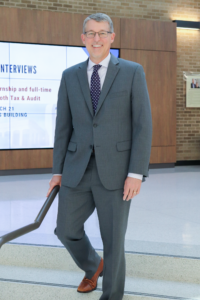
Wherever He may send you.
May He guide you through the wilderness,
Protect you through the storm.
May He bring you home rejoicing
At the wonders He has shown you.
May He bring you home rejoicing
Once again into our doors.”
Each year since becoming Dean of the College of Business Administration in May 2016, Dr. Brad Crisp (’93) has sent December and May graduating seniors into the world with the words of that favorite Celtic blessing spoken over them.
“The prayer points to the blessings of God’s presence in all circumstances,” Crisp said, “as well as the hope that our students will remain connected with us, telling the stories of what God has done in their lives.”
That excerpt from the prayer also offers peace and a reminder that home – and the relationships that go with being home – are always available to everyone. It’s appropriate that Crisp would choose a lyric about coming home as the blessing he would speak over students. If Crisp’s eight-year tenure as the Dean of COBA is marked by one thing, it would be how much he values relationships.
Relationships with students. Relationships with colleagues. Relationships with graduates, donors, and friends of the university. Relationships with family. It’s who he is, and it’s been his lighthouse during his eight-year tenure as Dean.
friends of the university. Relationships with family. It’s who he is, and it’s been his lighthouse during his eight-year tenure as Dean.
“Brad has kept us focused on relationships,” said Tim Johnston (’80), Assistant Dean of COBA. “We want to engage our students while they complete their studies, but we need to help each other for a lifetime. I like the blessing he always shared with our graduating students because it demonstrates his kind pursuit of relationships.”
Crisp delivered the blessing over graduating seniors one final time as Dean in early May before beginning a year-long sabbatical. ACU will name a new Dean of COBA sometime this summer before Crisp returns in 2025-26 as a full-time faculty member.
The fifth Dean of COBA since it became a college in 1981, Crisp leaves the post with a long list of accomplishments, but just as long a list of people influenced and relationships created. Those are part of what has made his tenure as Dean a success.
“Brad carries himself with dignity, honor, and a spirit of Christ-like humility,” said Andy Little (’97), Associate Dean of COBA and Associate Professor of Business Law. “He constantly reminds me to elevate my perspective, see the good in others, and treat people as worthy of our highest respect. I’ve been blessed to have a handful of good professional mentors, but none have had Brad’s exceedingly rare combination of kindness, wisdom, intellect, patience, and faith. We will miss his influence on the college dearly, but he deserves a sabbatical and time to reflect and recharge. I look forward to being his colleague and friend on the faculty for many more years.”
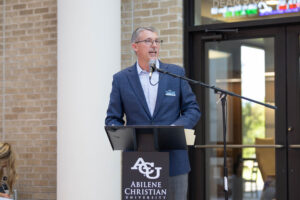 The list of accomplishments during his tenure is long and has COBA positioned to continue its rise when the new Dean steps in later this year. During his eight years, Crisp has hired more than one dozen new faculty members plus key administrative staff, overseen a complete renovation of the Mabee Business Building, moved COBA into the world of online education, successfully integrated technology into the core curriculum, and led the charge to require internships. He has overseen successful accreditation processes for the Accreditation Board for Engineering and Technology (ABET) and the Association to Advance Collegiate Schools of Business (AACSB).
The list of accomplishments during his tenure is long and has COBA positioned to continue its rise when the new Dean steps in later this year. During his eight years, Crisp has hired more than one dozen new faculty members plus key administrative staff, overseen a complete renovation of the Mabee Business Building, moved COBA into the world of online education, successfully integrated technology into the core curriculum, and led the charge to require internships. He has overseen successful accreditation processes for the Accreditation Board for Engineering and Technology (ABET) and the Association to Advance Collegiate Schools of Business (AACSB).
Many of these accomplishments resulted from the college’s completed 2022 Strategic Plan, which built on the strengths he inherited and positioned COBA to reach new heights through the college’s new 2026 Strategic Plan. The college’s endowments grew by more than $50 million during Crisp’s tenure, advanced significantly by a $29 million gift to COBA from the Dukes family in 2022. Crisp also directed new scholarship funds to attract and retain residential business students.
He’s done that without letting go of his belief in the vision set out for COBA: to connect, inspire, and equip Christian business and technology professionals, who honor God and bless the world.
“Brad is steady, and he quietly makes progress on the plans we have set out,” Johnston said. “He has stayed focused on the goals at hand and helped us take the right next step. That helped us keep moving, and we steadily made progress. Brad is a scholar dedicated to teaching and scholarly work. He poured into actively engaging with AACSB, serving on many site-visit reviews. He garnered insights that guided us through successful AACSB re-accreditation processes. He took to heart the desire to advance our college with continuous improvements.
“Brad has navigated the difficulties of attracting talented scholars to ACU and our mission,” Johnston said. “He did that at a time when online education has been a driving force for all business schools across the country. All new hires would have to be capable of teaching our residential and online students. The drive to help all faculty build the skillset to teach with multiple modalities is a critical accomplishment. A snapshot of the faculty in each program – many of whom Brad hired – will show everyone an impressive lineup of credentials and people of character who are moving the mission and our vision forward.”
Crisp recognizes that much of his success stems from his deep history with ACU, having been immersed in the ACU culture since he was young. His father, Don Crisp (’64) was Chairman of the Board of Trustees, and his father-in-law is former ACU president and current chancellor, Dr. Royce Money (’64).
And he’s following in the footsteps of men like, among others, Dr. Bill Petty (’64), Dr. Jack Griggs (’64), and Dr. Rick Lytle, who taught and mentored thousands of students over the years, including Crisp.
“Being the dean of this college is about legacy and relationships because you’re following in the footsteps of people who’ve done this and shown the way and built a foundation for what you’re doing,” Crisp said. “I’m fortunate to have important, ongoing relationships with those men. I also have relationships with so many peers, donors, and other people who love this place and want to figure out how to help the current students in what they want to accomplish.”
of people who’ve done this and shown the way and built a foundation for what you’re doing,” Crisp said. “I’m fortunate to have important, ongoing relationships with those men. I also have relationships with so many peers, donors, and other people who love this place and want to figure out how to help the current students in what they want to accomplish.”
Crisp will leave the job having positioned the next dean for success but knowing that a new set of challenges awaits whoever is next to lead COBA.
“Our students are coming from different perspectives within and outside the Christian world,” Crisp said. “We can’t make the same assumptions about who they are and what they know. We must create opportunities for them to engage their faith as they acquire the skills needed to become the professionals we want them to be. And at the end of the day, they’re going to be the ones that decide who they want to be and how they live.
“But we’ve got a tremendous opportunity to put them in connection with other people who are going to give them a vision for what their life could look like as a Christian business or technology professional,” he said. “I don’t think we’ve finished that process at all. We are wrestling with how we do that. I hope the next team will help us push that forward in some important ways, just as we started online conversations before I became dean. And we settled some of those things. So, can we build on that? Can we put new processes and structures in place and maintain that as a primary focus of who we are and what we do?”
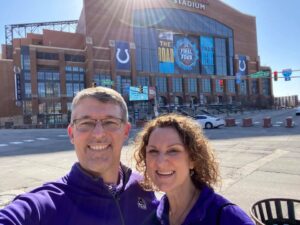 Crisp said he plans to use his sabbatical to recharge his batteries, re-tool for research and teaching, travel with his wife Jennifer (’93), visit family, and await the arrival of a second grandchild. He’ll return to the classroom at ACU in the fall of 2025, where he will again engage with students daily, helping lead them in the direction that best fits their skills.
Crisp said he plans to use his sabbatical to recharge his batteries, re-tool for research and teaching, travel with his wife Jennifer (’93), visit family, and await the arrival of a second grandchild. He’ll return to the classroom at ACU in the fall of 2025, where he will again engage with students daily, helping lead them in the direction that best fits their skills.
“I’ve always enjoyed the engagement with students,” Crisp said. “I’ve got 15 students in the one class I’m teaching right now, and the first assignment was a cover letter and resume, so I’m helping them think from day one about who they are and how they want to present themselves professionally.”
The relationships with students and faculty as colleagues excite Crisp about the next season of his life.
“I will miss the opportunity to engage with as broad a group as I have had the last eight years,” Crisp said. “The relationship is different when you manage people instead of working alongside them as colleagues. I have certainly had to have some hard personnel conversations, but these can be holy times, too. I’ve also had the chance to walk with people through hard times, helping them work through issues, and those moments are special. Some of my free time will allow me to create opportunities that keep me engaged with people inside and outside ACU. I don’t know exactly where my focus will be, but I know I’ll want to do more than be in the office 9 to 5 and then be done.”
With a focus on doing what he finds most important: building relationships.
by M. C. Jennings | May 2, 2024 | Academics, Accounting, COBA Faculty, Faculty Testimonials, Faith Infusion, MAcc, Uncategorized
written by special contributor Lance Fleming
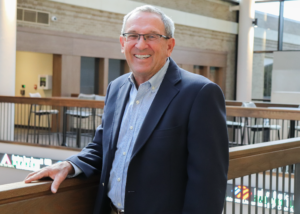 It shouldn’t surprise anyone who knows him that Bill Fowler – who will retire in June after 40 years on the COBA faculty – will be teeing up a golf ball shortly after he turns out the lights one last time in his Mabee Business Building office.
It shouldn’t surprise anyone who knows him that Bill Fowler – who will retire in June after 40 years on the COBA faculty – will be teeing up a golf ball shortly after he turns out the lights one last time in his Mabee Business Building office.
Since he joined the COBA faculty as a professor of Accounting, Fowler was always easy to find. He was either at work, at home, at church, or on the golf course. And it was likely the latter place where he could be found, more often than not.
“I imagine I’ll be out on the golf course pretty quickly,” said Fowler, who admits to a “four-ish” handicap he hopes to nudge down a little further in retirement. “Some people would say I can’t play much more than I already do, but I’ll give it a shot.”
Fowler’s love of golf is one of the first things that comes up among his colleagues when asked about his time at ACU and how difficult it will be to replace a man whose desire for every student he’s taught is to make a lifetime friend. The other is his sense of humor, which keeps his conversations, classroom, and office enveloped in laughter.
“I like to have fun,” Fowler said. “I have enjoyed harassing students and the people up and down the hallways in our building. We have a good time, which surprises some people. That’s one of the things I’ll miss. I’ll miss class because I still love being with the students. But I’ll miss hanging out in the halls and interacting with people.”
That’s because Fowler is a relationship-builder. He has kept hand-written grade books from his first 15 or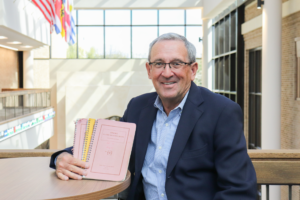 20 years on the ACU faculty and will refer to them when he’s thinking of a former student, or currently, the child of a former student. It’s his way of reconnecting to those relationships.
20 years on the ACU faculty and will refer to them when he’s thinking of a former student, or currently, the child of a former student. It’s his way of reconnecting to those relationships.
In a recruiting video posted to the COBA Facebook page in 2021, Fowler showed those grade books and said “What’s important to me about these books is not the grades, but these are my friends from years ago. As you come, we hope that you aren’t just a student but a lifetime friend.”
“That’s the whole deal right there,” Fowler said. “I’m not going to say I know or remember 100 percent of the names in those books or of the students I’ve taught, but I can see probably 90 percent of the faces of the students I’ve taught. And I know where most of them are living and working. That’s been the greatest blessing of all; just being a snippet of their walk and maybe a continued part as they go forward. That’s been the greatest part about being here.”
Dr. Brad Crisp (’93), who has served as Dean of COBA since May 2016, said the relationship part of Fowler’s personality is the most important part of what makes him an excellent instructor.
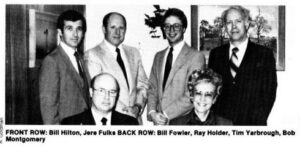
photo courtesy of the ACU Prickly Pear
“When you do something for as many years as Bill has done it, he’s got a whole host of students out there that are appreciative of him and grateful for him,” Crisp said. “I see him light up when accounting firms come back on campus, and he’s talking to each of them. And if they were a student here, he wants to talk to them and find out what’s going on in their lives and about their experience working at the firm they’re representing. He has been the example of investing in lifetime relationships with students.”
What Fowler doesn’t want, though, is a classroom full of people who don’t know how to communicate or see the bigger picture. That’s why fundamental business and communication skills are part of what he teaches.
“Earlier this semester in my graduate class, I gave an assignment one day to write a letter to a client explaining a difficult situation,” Fowler said. “Some of them asked me, ‘Write a letter? I don’t think you have to write letters anymore.’ But the point was, I wanted them to think about how to communicate an idea to someone who needs to understand the direction. The ability to explain situations is what separates people as they go forward. The people that can see the big picture and have the ability to communicate will make an impact on others.”
The impact Fowler has made on his students over the last 40 years is because they know he cares more about them as people than as future accountants.
“At the end of every year, I usually tell the students in my classes that I don’t care if they become an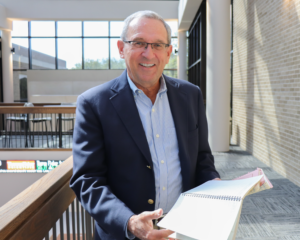 accountant or not; that’s not my job to decide what they’re going to become in life,” Fowler said. “I want them to have learned about who they are and to take whatever that is and whatever that means and use their talents to serve God and others.
accountant or not; that’s not my job to decide what they’re going to become in life,” Fowler said. “I want them to have learned about who they are and to take whatever that is and whatever that means and use their talents to serve God and others.
“If that’s becoming an accountant, that’s great,” he said. “And if they become an accountant, I want them to be the best accountant possible. I care about that, and that’s what we’ve talked about. But some of my accounting students are now funeral home directors, teachers, or stay-at-home parents, and people have no idea how smart they are as accountants. But the thing I want every student to do is to use their talent and do everything for God’s glory. And if you come back and you’re not an accountant, don’t hang your head. Just let me know what you’re doing, and how you’re serving God and others.”
Fowler’s ability to connect with his students was never more evident than during one five-minute period in one of his classes in the fall of 2014. Earlier that summer, one of his daughters suffered an Arteriovenous Malformation (AVM) rupture that required surgery and substantial rest and recovery. One day in class, Fowler updated his students on his daughter’s condition when he broke down.
“I was trying to update them on the situation, but I wasn’t doing very well,” said Fowler, who got emotional recounting the story. “I paused because I was breaking up a little bit, and this quiet student with her soft voice asked, ‘Mr. Fowler, can we pray for you?’ I was blubbering and said that would be OK, so the students gathered around me and she led the prayer, and it was awesome. If I can point to a five-minute segment out of the 40 years here at ACU, that would be near the top.”
And it’s because it confirmed everything Fowler knew to be special about ACU.
“That day told me what’s special about ACU,” he said. “I feel comfortable sharing part of my life and students feel comfortable enough to ask if they can pray for you in that moment, and then surround you and pray for you.
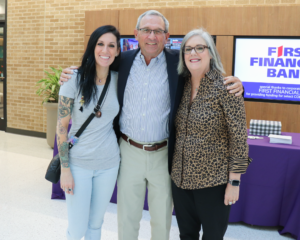 “I’m thankful to have been in this place with students who care for me and vice versa,” Fowler said. “That day there was a sense of sharing something with those kids and receiving the peace of Christ in return. I was grateful for the moment. I don’t remember the exact words, but what she said and prayed for was what we needed, and it felt comfortable and I was grateful that it provided a sense of peace. I’ll miss those moments more than anything because those moments tell you everything about what ACU is and what it means to me.”
“I’m thankful to have been in this place with students who care for me and vice versa,” Fowler said. “That day there was a sense of sharing something with those kids and receiving the peace of Christ in return. I was grateful for the moment. I don’t remember the exact words, but what she said and prayed for was what we needed, and it felt comfortable and I was grateful that it provided a sense of peace. I’ll miss those moments more than anything because those moments tell you everything about what ACU is and what it means to me.”
Those moments – the ones in the classroom, the ones he shares with students during conference time, the ones he enjoys with colleagues down the hallway or in the Mabee Business Building – made the decision to retire difficult for Fowler. But He knows it’s time for his next chapter and looks forward to writing it.
“I’ve struggled with not being part of this world anymore,” he said. “It was a hard decision, but if you’re going to make space for the next chapter of your life, you’ve got to make space. Truthfully, I don’t know what the next chapter holds for me. I will play a lot of golf, and my wife and I will travel. But I don’t even know where we’re going until we get in the car, and I’m looking forward to that part of the next chapter of my life.”
by M. C. Jennings | Apr 25, 2024 | Academics, Accounting, Alumni Spotlight, COBA Faculty, Faith Infusion, MAcc, Uncategorized
written by special contributor, Lance Fleming
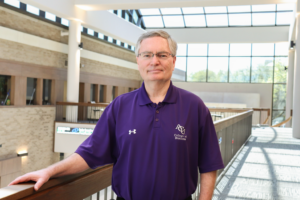 Dr. John Neill took a most circuitous route to a 40-year career teaching accounting and finance at three universities, including spending the last 24 years at ACU.
Dr. John Neill took a most circuitous route to a 40-year career teaching accounting and finance at three universities, including spending the last 24 years at ACU.
When Neill retires at the end of the 2023-24 school year, he will leave a large hole to fill in COBA. While not as gregarious as longtime colleague Bill Fowler – also retiring at the end of the school year after 40 years of service to ACU – Neill’s steady hand, wise words, and unwavering loyalty to the mission of ACU and COBA will be missed.
But had it not been for a simple twist of fate while he was a student at ACU, Neill might never have gotten into teaching, much less accounting and finance.
Neill – who lived in Abilene as a child before moving away and returning – graduated from Cooper High School in 1977. He enrolled at ACU and graduated in 1980, then worked for Pennzoil in Houston before returning to ACU to study for a master’s degree in Religious Studies.
While at ACU, he was asked to serve as an adjunct professor for an accounting class while working on his graduate degree. Surprising himself, he fell in love with the classroom. So much so that when he finished his master’s in 1984, he took off for Gainesville, Florida, where he earned his PhD in accounting from the University of Florida in 1990.
Leaving the corporate world behind and turning his focus to teaching, Neill made stops at Florida State University and Chapman University (Orange Country, California) before returning to ACU in 2000, where he finished his career.
“I never really wanted to be a preacher, but I wanted to be a minister of some sort,” Neill recalled. “Maybe it’s sort of the same mentality of teaching and preaching, but I’m not sure about that. I taught some as a doctoral student at the University of Florida, and then my first job was at Florida State University. And as I went along, I realized how much I enjoyed being in the classroom.
“After being at Florida State, I went to Chapman University, a private school without the Christian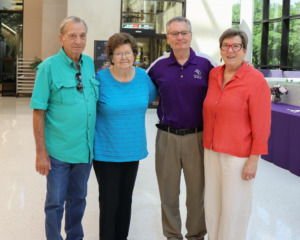 emphasis,” he said. “I liked the small, private nature of the school, but I missed the emphasis on a Christian education. When I had the opportunity to come back home and back to ACU, I found some of everything I wanted.”
emphasis,” he said. “I liked the small, private nature of the school, but I missed the emphasis on a Christian education. When I had the opportunity to come back home and back to ACU, I found some of everything I wanted.”
The relationships with students and colleagues, and the opportunity to work in an environment that matched his beliefs kept Neill at ACU when he could have gone to other universities or numerous jobs in the private sector.
“One of the main reasons I stayed at ACU is the mission,” he said. “I believe what we do and how we do it is important. The other reason is the colleagues I’ve worked with over the years. I enjoy the people I work with in our department. When I went to school at ACU and began working here, people always asked why I stayed, and I always said it was because of the people and relationships.”
He was also working for a university that has built one of the top business schools in the country and was the recipient of a game-changing $29 million gift from the Bill and Janie Dukes estate last year that will revolutionize COBA in countless ways. Before that gift, though, Neill believed the business students graduating from ACU were as good as those graduating from any other school in the country.
“I’ve had some partners in some of the top accounting firms in the country come to campus and tell me, ‘The students here (at ACU) are really good, but they don’t think they’re as good as they are,’ “ Neill said. “Sometimes our students might be intimidated because they work with a bunch of people who went to Texas or Texas A&M or SMU or wherever, but they shouldn’t feel that way because they have been well-prepared.
 “We have a good reputation of having prepared students who work hard, and we’re proud of that,” he said. “I want our students to realize that they are getting a quality education, but the most important thing is the Christian ideals they’re being taught – along with finance or accounting or whatever it might be – don’t stop when they leave here. We all want them to find a church home wherever they are, be part of the community, and have a work-life balance. Work is important, but it can’t be their entire life.”
“We have a good reputation of having prepared students who work hard, and we’re proud of that,” he said. “I want our students to realize that they are getting a quality education, but the most important thing is the Christian ideals they’re being taught – along with finance or accounting or whatever it might be – don’t stop when they leave here. We all want them to find a church home wherever they are, be part of the community, and have a work-life balance. Work is important, but it can’t be their entire life.”
Neill said he would miss the chance to talk to students and give that kind of advice, along with words of wisdom on what ACU can offer students.
“I’ve never taught freshmen; the classes I teach are traditionally a second-semester junior and a senior-level class,” Neill said. “But when I was department chair, I met with the first-year students in a new student orientation setting. One of the main things I always told him was they would get a fresh start here. A person who was the most popular in high school might not be that here. Conversely, someone with a bad reputation could start over here. Or if a student’s grades weren’t good in high school, they can turn them around here. I wanted to ensure they understood they had a fresh start here.”
It was that style that stuck out to Dr. Brad Crisp (‘93), the Dean of COBA when thinking about Neill and his impact on the students who have gone through the Mabee Business Building.
“John Neill is a genuine, personable guy with a sneaky sense of humor,” Crisp said. “He has done an excellent job for us and his students. I remember his presence, and I think the students appreciated him. He’s somebody who is one of those people at the center of living out the commitment we have for our students.”
Neill’s relationships with students and colleagues were changed in 2020 by COVID, the global pandemic that thrust millions into online education, whether they were ready for it or not. It also pushed Neill to begin thinking about his retirement, perhaps sooner than he had planned.
“Teaching during COVID was very tough,” Neill said. “When we came back, everyone was socially distanced, so it was hard to get to know students. I taught some students who never saw me without a mask, so they probably never really knew who I was. It was difficult to reach students. I taught some classes I didn’t get to know well and didn’t like that.”
That desire and ability to relate to students and colleagues has always stood out about Neill, said Dr. David Perkins, the Chairman of the Accounting Department. Perkins first met Neill when the former was a doctoral student at Texas A&M. The chairman of the Accounting Department at A&M asked him to take a prospective faculty member to dinner, mainly because he was a member of the Church of Christ, as was the prospective faculty member, who happened to be John Neill.
Perkins, the Chairman of the Accounting Department. Perkins first met Neill when the former was a doctoral student at Texas A&M. The chairman of the Accounting Department at A&M asked him to take a prospective faculty member to dinner, mainly because he was a member of the Church of Christ, as was the prospective faculty member, who happened to be John Neill.
Neill didn’t take the job at Texas A&M, but years later Perkins was hired at ACU and the two began a longtime relationship as friends and colleagues.
“Although John’s career took a different path, we eventually became colleagues teaching accounting at ACU,” Perkins said. “John is recognized as an excellent teacher, scholar, and a humble colleague and friend. He has been very gracious in helping me transition into the role of department chair when he decided to step down after leading the department for several years. John will be difficult to replace. We have been blessed to have him serve ACU, and it’s been an honor to call him a colleague and friend.”
A lifelong learner and teacher, Neill plans to do plenty of learning in the days immediately following his final day at ACU. He and his wife are taking a month-long trip to Japan, a vacation canceled in 2020 because of COVID.
“I love to travel, and you can always learn something, no matter where you go,” Neill said. “Whether you get in a car and drive for three hours or get on a plane or ship and go somewhere across the world, you can learn something about it. We’ll have the chance to experience a different culture, and I want to see what that’s like. I want to see it. To experience it. To keep growing and learning.”
by M. C. Jennings | Mar 21, 2024 | Academics, COBA Events, COBA Faculty, College Decisions, Current Students, Faith Infusion, Special Speakers, Uncategorized
written by special contributor, Lance Fleming
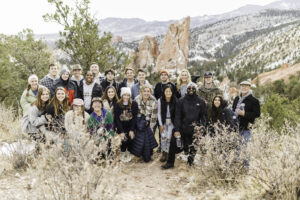 For 26 years, the ACU College of Business Administration has hosted a Leadership Summit in the mountains of Colorado intended to re-energize the mind, body, and soul. Each Summit takes on a life of its own, providing answers to the questions the attendees bring with them each year.
For 26 years, the ACU College of Business Administration has hosted a Leadership Summit in the mountains of Colorado intended to re-energize the mind, body, and soul. Each Summit takes on a life of its own, providing answers to the questions the attendees bring with them each year.
The recently completed 2024 version of Leadership Summit wasn’t different. This year’s version might have been the most diverse session of any of the 26 that have occurred.
Established in 1998 in the College of Business Administration, Summit is a one-week, 3-hour course hosted in picturesque Colorado. The course blends academic rigor with an environment ripe for deep, personal, and lasting encounters with Jesus. Dr. Rick Lytle, Tim Johnston (‘80), and Mike Winegeart (’86) dreamed of an experience that would take students out of the regular classroom and inspire them to think of their future work as missional. The first Leadership Summit was held in 1998, and the trio would go on to be involved in various aspects of the class over the next few decades.
Leadership Summit is open to all majors and classifications on campus – it’s not just for business students. Because this year’s cohort consisted of so many non-business majors, Dr. Dennis Marquardt, Associate Professor of Management and Director of the Lytle Center for Faith and Leadership, said Summit 2024 started a bit differently than other sessions.
“This was one of our most diverse groups along the lines of classification and major, so the first few days of Summit were really about getting to know each other,” he said. “It takes time to trust one another and be vulnerable with each other, which is an important aspect of the growth process at Summit. We also hosted more speakers than ever and from a wide range of industry backgrounds, so the week was packed, especially the first two days. By Wednesday, I noticed the group came together and opened up around some deep spiritual topics.”
The base curriculum for this year’s Summit centered around two books: Christian Reflections on the Leadership Challenge by Jim Kouzes and Barry Posner and The Freedom of Self-forgetfulness by Tim Keller. Each day is assigned one of the five leadership practices from the Leadership Challenge – Model the Way, Inspire a Shared Vision, Challenge the Process, Enable Others to Act, and Encourage the Heart – but every speaker is encouraged to share their spiritual journey in whatever way the Spirit moves.
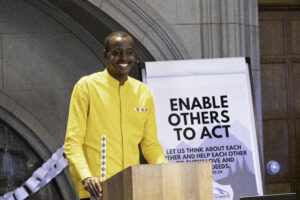
Serge Gasore (’09), co-founder of Rwanda Children
This year, Marquardt said, notable themes emerged across topics such as forgiveness from Serge Gasore (’09) and Tonya Carruthers, pride and humility from Tim Goeglein and Tony Roach (’01), and vision and role-modeling from Elise Mitchell (’83) and April Anthony (’89). Each speaker, he said, is encouraged to be transparent and vulnerable, creating an environment for deep collective reflection and sharing with the students. When that happens, Jesus takes over, and theory and books fade into the background.
“It’s one thing to learn about theory and read textbooks on leadership, and there certainly is a place for that,” Marquardt said, “but true learning and growth happens in community and relationships. Summit is distinct because it pairs the best leadership teaching with the spirit and heart. The environment is ripe for true reflection on how we become the servants God calls us to be so that we might be people of influence known for bearing hope, peace, and love.”
Hayden Poorman – a senior from Tuscola graduating in May and triple-majoring in finance, accounting, and information systems – completed his second trip to Summit in January. Like last year, Poorman said he left Colorado Springs with a definite direction for his life.
“Last year, I felt incredibly empowered to make changes in my life and impact those around me,” Poorman said. “For instance, after coming down from the mountain, my friend Matthew Trow (’24) and I initiated a Real Estate & Banking club on campus to assist students in navigating the industry. This year, I went to Summit seeking Godly wisdom and guidance and a time to wrestle with my inner struggles.
said. “For instance, after coming down from the mountain, my friend Matthew Trow (’24) and I initiated a Real Estate & Banking club on campus to assist students in navigating the industry. This year, I went to Summit seeking Godly wisdom and guidance and a time to wrestle with my inner struggles.
“Instead of feeling energized and engaging in constant hiking and exploration (though I did still hike), I found solitude in the mountain landscape and sought God,” he said. “ I firmly believe that God worked on me in the stillness of the mountains. I left the mountain prepared to confront my final semester of college and effectively navigate the valley I was traversing.”
Poorman said one reason he felt ready to take on the final weeks of his collegiate experience was the nightly conversation with his roommate on the trip, Mason Graham (’25).
“We discussed the day’s topics and delved into how life was unfolding for each of us, offering support and encouragement,” Poorman said. “Mason played a pivotal role in helping me articulate my thoughts and was instrumental in navigating my journey through faith and suffering.”
Allie Harper, a junior Bible and ministry major from Carrollton, was deeply affected by the connections with students and speakers during the six days spent on the mountain.
 “I think what makes Summit so impactful for people is that you get to retreat from everyday routine and spend time with like-minded people,” Harper said. “The connections and friendships I made at Summit are special because of our unity in Christ. Those connections have given me people to rely on, whether needing strong leaders to help with a ministry event or business and finance advice.
“I think what makes Summit so impactful for people is that you get to retreat from everyday routine and spend time with like-minded people,” Harper said. “The connections and friendships I made at Summit are special because of our unity in Christ. Those connections have given me people to rely on, whether needing strong leaders to help with a ministry event or business and finance advice.
“Something I remembered during one of the morning sessions was the people in my life I love who don’t know Christ,” she said. “Needless to say, I was a teary mess but also felt loved and encouraged by those who sat with me and prayed for those people. It reminded me that sometimes we have to sit in grief, but the Lord always brings hope and joy.”
This year’s Summit was Harper’s first venture to the mountain castle, and she said she came away with a deeper appreciation of the skills needed to be effective in ministry.
“I wasn’t sure what exactly to expect at Summit, but the whole week, I was surprised by the connections to faith, scripture, and community,” she said. “I saw what good Christian leadership looks like through the speakers, professors, and fellow students. It reminded me of the importance of leadership skills and not just a knowledge of scripture. I realized that to be effective as a minister, I need both. I would encourage those who aren’t pursuing a career in ministry but in the business world that God has called and equipped them because the world needs more Christ-like teachers, financial advisors, doctors, and salespeople. I left the week grateful because I had been equipped with scripture and the leadership skills to make me a better minister.”
And those moments – of reflection, self-awareness, and enlightenment – help make the moving parts that go into planning a week-long, out-of-state conference worth it for Marquardt.
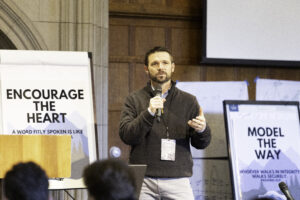
Dr. Dennis Marquardt
“There was just a moment this year when the Summit program began, and I looked at all of us worshipping together and about to embark on this special experience for the next week, and it broke me,” Marquardt said. “God is good. And He is gracious to allow us such a transformational experience.”
And that experience is what the first 26 Leadership Summits have given each participant and will continue to be the focus of in the future.
“God does amazing things, and He chooses to do those things through His people,” Marquardt said. “When we surrender to Him, our lives become this grand Kingdom adventure (which is not always safe or easy), but it allows us to serve others in transformational ways. That service might be as a business leader, community member, or in a family, but we will all have the opportunity to step into it. We want Leadership Summit to create leaders who are servants first and run into the storms and fires of life to be bearers of hope, peace, and life.”
by M. C. Jennings | Mar 7, 2024 | Academics, Careers In..., COBA Faculty, College Decisions, Current Students, Dukes School of Finance, Financial Management, Uncategorized
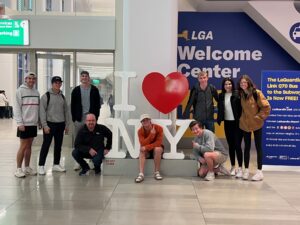 Most trips to New York City involve plenty of sightseeing, tours, shows and musicals, and expensive trips to some of the world’s best restaurants. They don’t usually involve sit-down meetings with some of the top financial minds in the country. But that was the design of a trip to New York last fall for eight students in ACU’s Dukes School of Finance.
Most trips to New York City involve plenty of sightseeing, tours, shows and musicals, and expensive trips to some of the world’s best restaurants. They don’t usually involve sit-down meetings with some of the top financial minds in the country. But that was the design of a trip to New York last fall for eight students in ACU’s Dukes School of Finance.
Those students – seven of whom are in the first cohort of the Dukes Scholars – were led on the trip by Dr. Jonathan Stewart, professor in the Dukes School of Finance. Stewart has been taking students to New York for several years, allowing them to visit some of the top financial institutions in the world and ask questions of the leaders of those companies to find out what it takes to make it in New York.
Stewart and his students were in New York from Oct. 18-22, visiting with leaders from Bank of America, Evercore, Court Square Capital Partners, Tiger Global Management, RBC Capital Markets, and Goldman Sachs. They toured Nasdaq and met with some of the leadership of the second-largest stock exchange in the world. They also met with a panel of young professionals in the finance industry who are members of the Manhattan Church of Christ.
“We had an opportunity to encourage and inspire those students to work in New York or another financial center,” Stewart said. “It’s all happening there (in New York), and we put our students in front of many talented people on the trip.
“We have a lot of students interested in investment banking, so going to Goldman Sachs and Royal Bank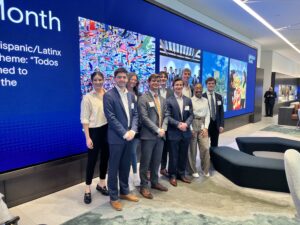 Canada (RBC) was great for them,” he said. “We went into RBC, where they set us up in the conference room, and we had people talking to us who were dealing in high-level investments and acquisitions daily.
Canada (RBC) was great for them,” he said. “We went into RBC, where they set us up in the conference room, and we had people talking to us who were dealing in high-level investments and acquisitions daily.
“Our students were able to interact with a wide range of people who had made a career out of that field, but also some in the room who were just a year or two older than our current students,” Stewart said. “That gave them a chance to interact with and ask questions of someone close to their age.”
Kaylee Smoot, a native of Corona, California, who will graduate in May with her Master’s in Accounting, said the time spent with executives of some of the top financial institutions in the country was invaluable.
“That time was priceless,” Smoot said. “We heard from many executives, including from specialized private equity firms and international finance companies, and even received a tour of the Goldman Sachs Headquarters. We had students ranging from first-year to graduate level, and we were each able to walk away with invaluable knowledge about what opportunities awaited us in our future careers.”
 Stewart said he always gets help from ACU alums in the financial industry, using their connections and contacts with industry leaders in New York to set up the trip. One of those ACU graduates who helped this year was COBA alum Steve Swinney (‘94), based in Colorado and the CEO of Kodiak Building Partners who tapped his contacts in New York to meet with students from his alma mater.
Stewart said he always gets help from ACU alums in the financial industry, using their connections and contacts with industry leaders in New York to set up the trip. One of those ACU graduates who helped this year was COBA alum Steve Swinney (‘94), based in Colorado and the CEO of Kodiak Building Partners who tapped his contacts in New York to meet with students from his alma mater.
Swinney said he hoped his contacts showed the ACU students all that is possible for them in finance.
“The Dukes School of Finance at ACU is a tremendous opportunity for finance students to have so many career doors opened to them that maybe they haven’t had in the past,” he said. “I wanted them exposed to all that is possible for them. They must know their ACU education is preparing them for great things. We need excellent Christian finance leaders in the business world.”
A crucial part of the trip for Stewart and Smoot was discussing how faith and business mix. Stewart said that while making connections was paramount for the students, allowing those students to see that faith and high finance can mix was just as important. That’s why the panel with professed Christians who are also leaders in the financial industry was part of the tour. The time shared at Manhattan Church of Christ was to ensure the ACU students left New York knowing their faith wouldn’t be trampled in the City That Never Sleeps.
“Taking your faith into the business world might look different in New York than it would in Abilene or Dallas because there are so many perspectives and different points of view in a big city than in a place like Abilene,” Stewart said. “But to see there’s a place for Christian businessmen and businesswomen to function and contribute and be part of that world was, hopefully, a healthy opportunity for our students.”
Dallas because there are so many perspectives and different points of view in a big city than in a place like Abilene,” Stewart said. “But to see there’s a place for Christian businessmen and businesswomen to function and contribute and be part of that world was, hopefully, a healthy opportunity for our students.”
Smoot, who hopes to secure a financial analyst position in Dallas after graduation, said those conversations were the most important to her on the trip.
“In recent decades, we have seen the damage immoral and unethical behavior can do in the finance industry, with many people’s livelihoods still suffering the consequences,” she said. “To receive an education that equips you with the knowledge to be successful in finance while grounding you with Christ-centered values strengthens your chances of being a light for Christ in a world and industry that desperately needs it.
“We already see an example of this in the STAR course offered at ACU, a student-managed investment fund I had the honor of leading last semester,” Smoot said. “We are exposed to real-world dilemmas involving not only the quantitative side of the stock market but also the qualitative side of the finance industry as we discuss the financial and ethical motivations behind different investments we make on behalf of the university.”
New York City comes with preconceived notions, from the friendliness of its citizens to the high cost of living to safety. But by sitting down with those industry leaders, touring Nasdaq, taking in a show on Broadway, going through the 9/11 Museum, and giving the students time to explore the city, Stewart said he hopes the students began to see New York in a new light.
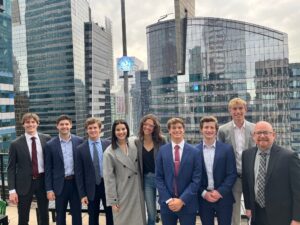 “We wanted the students to make real connections, and when you have eight students sitting in a room with three or four investment bankers, that’s a great opportunity,” Stewart said. “They had a real chance to talk to them, to exchange business cards, and network. There are so many stereotypes of New York, but it’s one of the world’s great cities, and having the experience of moving around and riding the subway and seeing the landmarks and everything that goes along with New York City was so much fun to share with those students. We see the cutthroat part of the financial industry in the movies and on TV all the time, and some of that is probably true. But many people are out there doing things the right way and have a faith background and a belief system, and they put that in action every day.”
“We wanted the students to make real connections, and when you have eight students sitting in a room with three or four investment bankers, that’s a great opportunity,” Stewart said. “They had a real chance to talk to them, to exchange business cards, and network. There are so many stereotypes of New York, but it’s one of the world’s great cities, and having the experience of moving around and riding the subway and seeing the landmarks and everything that goes along with New York City was so much fun to share with those students. We see the cutthroat part of the financial industry in the movies and on TV all the time, and some of that is probably true. But many people are out there doing things the right way and have a faith background and a belief system, and they put that in action every day.”
And for Smoot, putting some of those preconceived ideas to rest was just as important as anything else she took away from the trip.
“When you think of Wall Street, you may imagine exhausted employees working 100-plus hours a week, day trading at a giant corporation that becomes their only identity,” she said. “I’m happy I walked away realizing that while the finance industry in New York does require hard work and long hours, those individuals still have a life. And many of their companies offer impressive on-site benefits to assist with the burden long workdays may exert on them. It makes someone’s dream of working on Wall Street shift from daunting to doable, as long as you are willing to still chase after it.”
And each trip Stewart leads helps to re-energize him, he said.
“I love going to New York and being in the middle of everything,” said Stewart, who thanked Swinney, David Swearingen, and Jim Litton (‘01) for their help in setting up the schedule of tours and visits. “It’s the heart of the financial world, especially in our country. I learn something new on every trip, and I come back energized, inspired, and thinking about ways I can incorporate what we’ve learned on the trips into what we’re learning in the classroom. It inspires me to stand in front of our students and encourage them to dream big and do what they want to do because they can make it happen. We are fortunate to have many people here and ACU friends and family willing to help make that happen.”
Swearingen, and Jim Litton (‘01) for their help in setting up the schedule of tours and visits. “It’s the heart of the financial world, especially in our country. I learn something new on every trip, and I come back energized, inspired, and thinking about ways I can incorporate what we’ve learned on the trips into what we’re learning in the classroom. It inspires me to stand in front of our students and encourage them to dream big and do what they want to do because they can make it happen. We are fortunate to have many people here and ACU friends and family willing to help make that happen.”
by M. C. Jennings | Feb 21, 2024 | Academics, COBA Faculty, Current Students, Uncategorized
 Long before Holden Rook and Brooks Gay were assigned a project in their entrepreneurship class requiring them to start a business, the roommates had already discussed starting their own venture.
Long before Holden Rook and Brooks Gay were assigned a project in their entrepreneurship class requiring them to start a business, the roommates had already discussed starting their own venture.
So when the class project met reality, they already had their plan ready.
Rook – a sophomore marketing major from The Woodlands – said the class brainstormed for “about 2-3 weeks” and then had to pitch the idea to Dr. Jim Litton, associate professor of Management Sciences and Director of the Griggs Center for Entrepreneurship & Philanthropy, who was teaching the entrepreneurship class.
“Brooks and I had expressed an interest in doing something before the class had even started, but it was Brooks who kick-started the idea in class,” Rook said. “Brooks was the brains behind the start of it since he’s from Abilene and knew the ins and outs of how to get our business started here locally.”
And that’s how Abilene Hat Company was born.
Gay – a junior business management major from Abilene – is a former baseball player at Abilene Wylie High School and last season at ACU, who had the original idea for a hat company.
“I wanted to create a hat company that represents Abilene and the surrounding areas because of the number of people who wear hats and how much pride people have in being from this area,” Gay said.
number of people who wear hats and how much pride people have in being from this area,” Gay said.
After making their pitch to Litton, getting approval, putting together a team, and dividing up responsibilities, the team – consisting of Gay, Rooks, ACU volleyball player Ashli Edmiston, Reece Westby, and Nick Schott – met about logistics and designs and began the process of giving life to the company.
“Our goal was to, first, make a good grade in the class,” Gay said. “We talked about our vision, bounced ideas off each other, and set our goals higher. We wanted to create the most revenue and profit in the current class and break the current record for revenue and profit ever in that class. We broke the current records and created the most revenue to date.”
The team is now just Gay and Rook, and they have moved the business forward to the point that they have a sales point online and in a storefront at Covey Apparel in Terrell, Texas.
“Our short-range goal was to find some local businesses willing to support another small business and give us a chance to get into their stores,” Rook said. “The long-term goal is to expand into all of West Texas to allow many people to see our brand.”
 The company’s most popular hat logo is a patch on a rope cap with the words “West Texas” atop a pump jack, an iconic symbol of one of the lifebloods of West Texas life.
The company’s most popular hat logo is a patch on a rope cap with the words “West Texas” atop a pump jack, an iconic symbol of one of the lifebloods of West Texas life.
“One of our long-term goals is to create different pieces of apparel with similar ideas and designs,” Gay said. “I want to represent where we are from, the pride the people of West Texas have by capturing those feelings and displaying them on a high-quality product. I believe the patch design with the oil rig does the best job of capturing the spirit of the hard-working people of West Texas.”
Gay and Rook said their COBA classes have given them insight into so many different aspects of running a business, from the entrepreneurial mindset to all the areas of running a company.
“The most beneficial things I’ve learned have been small pieces from numerous classes,” Gay said. “We use Excel to keep our books, we use marketing strategies in our social media, and many other entrepreneurship techniques from the classes I have taken.”
Rook echoed some of that when describing what he’s learned inside the walls of the Mabee Business Building.
“Definitely learned more about the entrepreneurial mindset,” Rook said. “You must be ready to adapt to the market and whatever it’s feeding you to succeed. Everything is always changing, and you must be ready to change.”
While Rook said the next stop is continued growth and perhaps adding additional employees, Gay said he wants to expand the business into collegiate athletics, where Name, Image and Likeness (NIL) now allows student-athletes to promote products in exchange for money.
wants to expand the business into collegiate athletics, where Name, Image and Likeness (NIL) now allows student-athletes to promote products in exchange for money.
“That would not only be mutually beneficial for us and the student-athlete but will also significantly push our brand,” Gay said. “The athletes we are connected with at large schools have significant social media presence and will grow our total audience.”
To learn more about entrepreneurship at ACU, click here.

 friends of the university. Relationships with family. It’s who he is, and it’s been his lighthouse during his eight-year tenure as Dean.
friends of the university. Relationships with family. It’s who he is, and it’s been his lighthouse during his eight-year tenure as Dean.  The list of accomplishments during his tenure is long and has COBA positioned to continue its rise when the new Dean steps in later this year. During his eight years, Crisp has hired more than one dozen new faculty members plus key administrative staff, overseen a complete renovation of the Mabee Business Building, moved COBA into the world of online education, successfully integrated technology into the core curriculum, and led the charge to require internships. He has overseen successful accreditation processes for the Accreditation Board for Engineering and Technology (ABET) and the Association to Advance Collegiate Schools of Business (AACSB).
The list of accomplishments during his tenure is long and has COBA positioned to continue its rise when the new Dean steps in later this year. During his eight years, Crisp has hired more than one dozen new faculty members plus key administrative staff, overseen a complete renovation of the Mabee Business Building, moved COBA into the world of online education, successfully integrated technology into the core curriculum, and led the charge to require internships. He has overseen successful accreditation processes for the Accreditation Board for Engineering and Technology (ABET) and the Association to Advance Collegiate Schools of Business (AACSB). of people who’ve done this and shown the way and built a foundation for what you’re doing,” Crisp said. “I’m fortunate to have important, ongoing relationships with those men. I also have relationships with so many peers, donors, and other people who love this place and want to figure out how to help the current students in what they want to accomplish.”
of people who’ve done this and shown the way and built a foundation for what you’re doing,” Crisp said. “I’m fortunate to have important, ongoing relationships with those men. I also have relationships with so many peers, donors, and other people who love this place and want to figure out how to help the current students in what they want to accomplish.” Crisp said he plans to use his sabbatical to recharge his batteries, re-tool for research and teaching, travel with his wife Jennifer (’93), visit family, and await the arrival of a second grandchild. He’ll return to the classroom at ACU in the fall of 2025, where he will again engage with students daily, helping lead them in the direction that best fits their skills.
Crisp said he plans to use his sabbatical to recharge his batteries, re-tool for research and teaching, travel with his wife Jennifer (’93), visit family, and await the arrival of a second grandchild. He’ll return to the classroom at ACU in the fall of 2025, where he will again engage with students daily, helping lead them in the direction that best fits their skills. It shouldn’t surprise anyone who knows him that Bill Fowler – who will retire in June after 40 years on the COBA faculty – will be teeing up a golf ball shortly after he turns out the lights one last time in his Mabee Business Building office.
It shouldn’t surprise anyone who knows him that Bill Fowler – who will retire in June after 40 years on the COBA faculty – will be teeing up a golf ball shortly after he turns out the lights one last time in his Mabee Business Building office. 20 years on the ACU faculty and will refer to them when he’s thinking of a former student, or currently, the child of a former student. It’s his way of reconnecting to those relationships.
20 years on the ACU faculty and will refer to them when he’s thinking of a former student, or currently, the child of a former student. It’s his way of reconnecting to those relationships.
 accountant or not; that’s not my job to decide what they’re going to become in life,” Fowler said. “I want them to have learned about who they are and to take whatever that is and whatever that means and use their talents to serve God and others.
accountant or not; that’s not my job to decide what they’re going to become in life,” Fowler said. “I want them to have learned about who they are and to take whatever that is and whatever that means and use their talents to serve God and others. “I’m thankful to have been in this place with students who care for me and vice versa,” Fowler said. “That day there was a sense of sharing something with those kids and receiving the peace of Christ in return. I was grateful for the moment. I don’t remember the exact words, but what she said and prayed for was what we needed, and it felt comfortable and I was grateful that it provided a sense of peace. I’ll miss those moments more than anything because those moments tell you everything about what ACU is and what it means to me.”
“I’m thankful to have been in this place with students who care for me and vice versa,” Fowler said. “That day there was a sense of sharing something with those kids and receiving the peace of Christ in return. I was grateful for the moment. I don’t remember the exact words, but what she said and prayed for was what we needed, and it felt comfortable and I was grateful that it provided a sense of peace. I’ll miss those moments more than anything because those moments tell you everything about what ACU is and what it means to me.” Dr. John Neill took a most circuitous route to a 40-year career teaching accounting and finance at three universities, including spending the last 24 years at ACU.
Dr. John Neill took a most circuitous route to a 40-year career teaching accounting and finance at three universities, including spending the last 24 years at ACU. emphasis,” he said. “I liked the small, private nature of the school, but I missed the emphasis on a Christian education. When I had the opportunity to come back home and back to ACU, I found some of everything I wanted.”
emphasis,” he said. “I liked the small, private nature of the school, but I missed the emphasis on a Christian education. When I had the opportunity to come back home and back to ACU, I found some of everything I wanted.” “We have a good reputation of having prepared students who work hard, and we’re proud of that,” he said. “I want our students to realize that they are getting a quality education, but the most important thing is the Christian ideals they’re being taught – along with finance or accounting or whatever it might be – don’t stop when they leave here. We all want them to find a church home wherever they are, be part of the community, and have a work-life balance. Work is important, but it can’t be their entire life.”
“We have a good reputation of having prepared students who work hard, and we’re proud of that,” he said. “I want our students to realize that they are getting a quality education, but the most important thing is the Christian ideals they’re being taught – along with finance or accounting or whatever it might be – don’t stop when they leave here. We all want them to find a church home wherever they are, be part of the community, and have a work-life balance. Work is important, but it can’t be their entire life.” Perkins, the Chairman of the Accounting Department. Perkins first met Neill when the former was a doctoral student at Texas A&M. The chairman of the Accounting Department at A&M asked him to take a prospective faculty member to dinner, mainly because he was a member of the Church of Christ, as was the prospective faculty member, who happened to be John Neill.
Perkins, the Chairman of the Accounting Department. Perkins first met Neill when the former was a doctoral student at Texas A&M. The chairman of the Accounting Department at A&M asked him to take a prospective faculty member to dinner, mainly because he was a member of the Church of Christ, as was the prospective faculty member, who happened to be John Neill. For 26 years, the ACU College of Business Administration has hosted a Leadership Summit in the mountains of Colorado intended to re-energize the mind, body, and soul. Each Summit takes on a life of its own, providing answers to the questions the attendees bring with them each year.
For 26 years, the ACU College of Business Administration has hosted a Leadership Summit in the mountains of Colorado intended to re-energize the mind, body, and soul. Each Summit takes on a life of its own, providing answers to the questions the attendees bring with them each year.
 said. “For instance, after coming down from the mountain, my friend Matthew Trow (’24) and I initiated a Real Estate & Banking club on campus to assist students in navigating the industry. This year, I went to Summit seeking Godly wisdom and guidance and a time to wrestle with my inner struggles.
said. “For instance, after coming down from the mountain, my friend Matthew Trow (’24) and I initiated a Real Estate & Banking club on campus to assist students in navigating the industry. This year, I went to Summit seeking Godly wisdom and guidance and a time to wrestle with my inner struggles. “I think what makes Summit so impactful for people is that you get to retreat from everyday routine and spend time with like-minded people,” Harper said. “The connections and friendships I made at Summit are special because of our unity in Christ. Those connections have given me people to rely on, whether needing strong leaders to help with a ministry event or business and finance advice.
“I think what makes Summit so impactful for people is that you get to retreat from everyday routine and spend time with like-minded people,” Harper said. “The connections and friendships I made at Summit are special because of our unity in Christ. Those connections have given me people to rely on, whether needing strong leaders to help with a ministry event or business and finance advice. 
 Most trips to New York City involve plenty of sightseeing, tours, shows and musicals, and expensive trips to some of the world’s best restaurants. They don’t usually involve sit-down meetings with some of the top financial minds in the country. But that was the design of a trip to New York last fall for eight students in ACU’s Dukes School of Finance.
Most trips to New York City involve plenty of sightseeing, tours, shows and musicals, and expensive trips to some of the world’s best restaurants. They don’t usually involve sit-down meetings with some of the top financial minds in the country. But that was the design of a trip to New York last fall for eight students in ACU’s Dukes School of Finance. Canada (RBC) was great for them,” he said. “We went into RBC, where they set us up in the conference room, and we had people talking to us who were dealing in high-level investments and acquisitions daily.
Canada (RBC) was great for them,” he said. “We went into RBC, where they set us up in the conference room, and we had people talking to us who were dealing in high-level investments and acquisitions daily.  Stewart said he always gets help from ACU alums in the financial industry, using their connections and contacts with industry leaders in New York to set up the trip. One of those ACU graduates who helped this year was COBA alum Steve Swinney (‘94), based in Colorado and the CEO of Kodiak Building Partners who tapped his contacts in New York to meet with students from his alma mater.
Stewart said he always gets help from ACU alums in the financial industry, using their connections and contacts with industry leaders in New York to set up the trip. One of those ACU graduates who helped this year was COBA alum Steve Swinney (‘94), based in Colorado and the CEO of Kodiak Building Partners who tapped his contacts in New York to meet with students from his alma mater. Dallas because there are so many perspectives and different points of view in a big city than in a place like Abilene,” Stewart said. “But to see there’s a place for Christian businessmen and businesswomen to function and contribute and be part of that world was, hopefully, a healthy opportunity for our students.”
Dallas because there are so many perspectives and different points of view in a big city than in a place like Abilene,” Stewart said. “But to see there’s a place for Christian businessmen and businesswomen to function and contribute and be part of that world was, hopefully, a healthy opportunity for our students.” “We wanted the students to make real connections, and when you have eight students sitting in a room with three or four investment bankers, that’s a great opportunity,” Stewart said. “They had a real chance to talk to them, to exchange business cards, and network. There are so many stereotypes of New York, but it’s one of the world’s great cities, and having the
“We wanted the students to make real connections, and when you have eight students sitting in a room with three or four investment bankers, that’s a great opportunity,” Stewart said. “They had a real chance to talk to them, to exchange business cards, and network. There are so many stereotypes of New York, but it’s one of the world’s great cities, and having the  Swearingen, and Jim Litton (‘01) for their help in setting up the schedule of tours and visits. “It’s the heart of the financial world, especially in our country. I learn something new on every trip, and I come back energized, inspired, and thinking about ways I can incorporate what we’ve learned on the trips into what we’re learning in the classroom. It inspires me to stand in front of our students and encourage them to dream big and do what they want to do because they can make it happen. We are fortunate to have many people here and ACU friends and family willing to help make that happen.”
Swearingen, and Jim Litton (‘01) for their help in setting up the schedule of tours and visits. “It’s the heart of the financial world, especially in our country. I learn something new on every trip, and I come back energized, inspired, and thinking about ways I can incorporate what we’ve learned on the trips into what we’re learning in the classroom. It inspires me to stand in front of our students and encourage them to dream big and do what they want to do because they can make it happen. We are fortunate to have many people here and ACU friends and family willing to help make that happen.” Long before Holden Rook and Brooks Gay were assigned a project in their
Long before Holden Rook and Brooks Gay were assigned a project in their  number of people who wear hats and how much pride people have in being from this area,” Gay said.
number of people who wear hats and how much pride people have in being from this area,” Gay said. The company’s most popular hat logo is a patch on a rope cap with the words “West Texas” atop a pump jack, an iconic symbol of one of the lifebloods of West Texas life.
The company’s most popular hat logo is a patch on a rope cap with the words “West Texas” atop a pump jack, an iconic symbol of one of the lifebloods of West Texas life. wants to expand the business into collegiate athletics, where Name, Image and Likeness (NIL) now allows student-athletes to promote products in exchange for money.
wants to expand the business into collegiate athletics, where Name, Image and Likeness (NIL) now allows student-athletes to promote products in exchange for money.